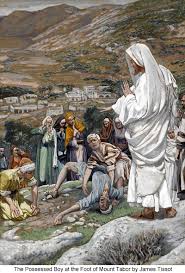HOMILY WEEK 07 01 – Year I
(Sir 1:1-10; Ps 93; Mk 9:14-29)
*************************************
Would you like to have a stronger, more powerful faith?
Consider doing a monthly poustinia in which you fast, and pray the prayer of the father in the Gospel today: “I believe, help my unbelief!”
It is noteworthy that Matthew begins today’s gospel with “Jesus, Peter, James and John came down the mountain to rejoin the other disciples.” These chosen three had just experienced a powerful theophany, a miracle, the transfiguration of Jesus during which they heard the Father’s voice blessing Jesus, saw Moses and Elijah speaking to Jesus about his passing in Jerusalem, and wanted to freeze that moment of a supernatural high.
The response of Jesus was to predict his passion and death in Jerusalem, and to take them down from the mountain. It was as if to say that trying to “achieve a high” is not what life is about. We are meant to live life with faith, in the valley where life is messy and darkness, not light, seems to so often prevail.
It was messy for Jesus and the disciples that day also. The first thing they were confronted was a boy possessed by an evil spirit that totally controlled and oppressed him. To this day, evil surrounds us, oppresses us and tries to control us.
 The father of the boy had some faith in Jesus – “If you are able” – but it needed to be strengthened, which Jesus did – “All things can be done for one who believes.” The man then uttered that beautiful prayer for a stronger faith that we could all use: “I believe; help my unbelief,” and Jesus healed the boy, setting him free.
The father of the boy had some faith in Jesus – “If you are able” – but it needed to be strengthened, which Jesus did – “All things can be done for one who believes.” The man then uttered that beautiful prayer for a stronger faith that we could all use: “I believe; help my unbelief,” and Jesus healed the boy, setting him free.
When asked by his disciples why they could not cast out the demon, Jesus replied simply, “This kind can come out only through prayer and fasting.”
Every month I enter into a poustinia (a Russian word meaning desert). For me, a poustinia is a 24-hour period of fasting on liquid alone (turmeric herbal tea), prayer, resting and writing. My prayer is made up of a series of “Lectio Divina holy hours” during which I read a passage, meditate on that passage, pray with the passage, and especially, spend time in contemplation on that passage. How encouraging to read in the gospel today, “this kind can come out only with prayer and fasting.” My mantra for my hour of prayer sometimes becomes “I believe; help my unbelief.”
While it is hard to measure the benefits of prayer and fasting, I do know that the prayer of contemplation certainly slows me down and helps me let go of the demon of work-a-holism. I literally “do nothing” for a whole hour except try to be present to the loving presence of Jesus and trust that his Spirit is carrying out within me whatever healing is needed at that moment, whether I feel anything or not.
Basically, in this kind of prayer, one tries to let go of all thoughts and feelings, so most often I don’t experience anything. That is not a negative thing, but rather the actual goal of this prayer, sometimes called the Cloud of Unknowing. That attitude is what makes contemplation a real prayer of faith. The fasting part helps to let go of the distractions of eating, and I find 24 hours on tea alone helps cleanse the body physically.
It is difficult to measure the effect or benefit of this kind of prayer. However, when sharing with another friend who does the same practice, we both agreed that we don’t know where we would be today, if it were not for that practice of contemplative prayer.
Here is a quote from Franciscan priest and spiritual writer Richard Rohr about meditation and contemplation: “Like used scaffolding, our sins fall away from us as unneeded and unhelpful because now a new and better building has been found. This is the wondrous discovery of our True Self, and the gradual deterioration of our false and constructed self.” (Adam’s Return, p. 64)
The first reading mentions that Wisdom is the first of God’s creation, and extolls it as the best of God’s gifts to us. I think, given today’s gospel, we would be very wise to take Jesus seriously, and enter into a more regular practice of prayer and fasting.
The Eucharist is our central and most important prayer, the summit of our liturgy, as Vat II puts it. It also includes an hour of fasting before we celebrate, to highlight its importance. Wise are they who make celebrating the Eucharist part of their week, or even day.
May our celebration today strengthen our faith and give us the motivation to follow Jesus more closely through a life of more regular prayer and fasting, perhaps even a monthly poustinia.



